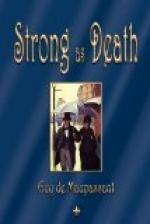He arose, clasped her close, kissing her half-open lips, as he used to do; then they crossed the two drawing-rooms, arm in arm, like a newly-married pair.
“Good-by, my friend.”
“Good-by, my friend.”
And the portiere fell behind him.
He went downstairs, turned toward the Madeleine, and began to walk without knowing what he was doing, dazed as if from a blow, his legs weak, his heart hot and palpitating as if something burning shook within his breast. For two or three hours, perhaps four, he walked straight before him, in a sort of moral stupor and physical prostration which left him only just strength enough to put one foot before the other. Then he went home to reflect.
He loved this little girl, then. He comprehended now all that he had felt near her since that walk in the Parc Monceau, when he found in her mouth the call from a voice hardly recognized, the voice that long ago had awakened his heart; then all that slow, irresistible renewal of a love not yet extinct, not yet frozen, which he persisted in not acknowledging to himself.
What should he do? But what could he do? When she was married he would avoid seeing her often, that was all. Meantime, he would continue to return to the house, so that no one should suspect anything, and he would hide his secret from everyone.
He dined at home, which he very seldom did. Then he had a fire made in the large stove in his studio, for the night promised to be very cold. He even ordered the chandeliers to be lighted, as if he disliked the dark corners, and then he shut himself in. What strange emotion, profound, physical, frightfully sad, had seized him! He felt it in his throat, in his breast, in all his relaxed muscles as well as in his fainting soul. The walls of the apartment oppressed him; all his life was inclosed therein—his life as an artist, his life as a man. Every painted study hanging there recalled a success, each piece of furniture spoke of some memory. But successes and memories were things of the past. His life? How short, how empty it seemed to him, yet full. He had made pictures, and more pictures, and always pictures, and had loved one woman. He recalled the evenings of exaltation, after their meetings, in this same studio. He had walked whole nights with his being on fire with fever. The joy of happy love, the joy of worldly success, the unique intoxication of glory, had caused him to taste unforgettable hours of inward triumph.
He had loved a woman, and that woman had loved him. Through her he had received that baptism which reveals to man the mysterious world of emotions and of love. She had opened his heart almost by force, and now he could no longer close it. Another love had entered, in spite of him, through this opening—another, or rather the same relighted by a new face; the same, stronger by all the force which this need to adore takes on in old age. So he loved this little




